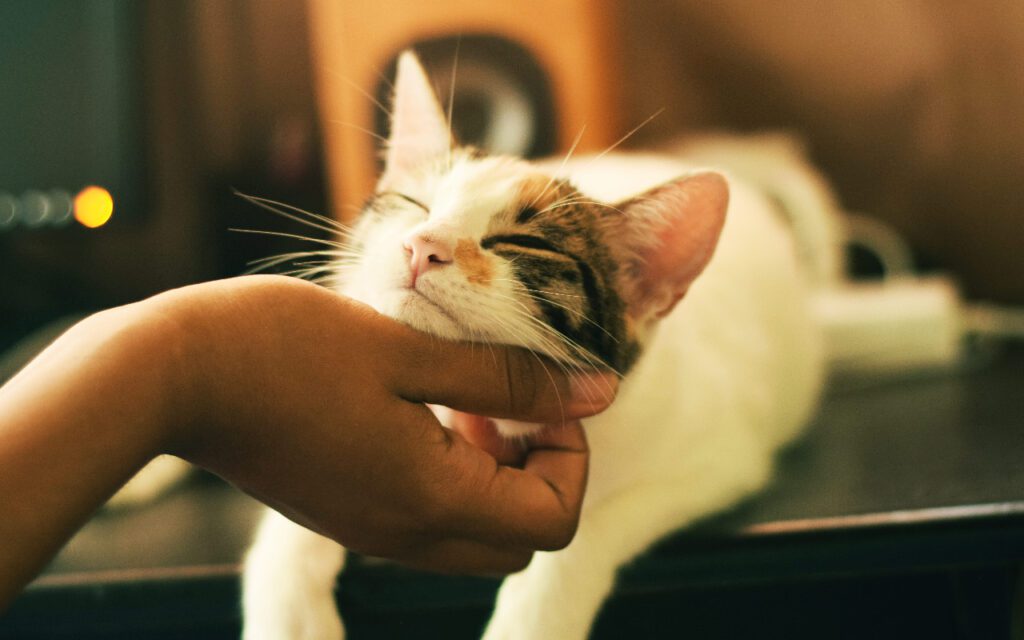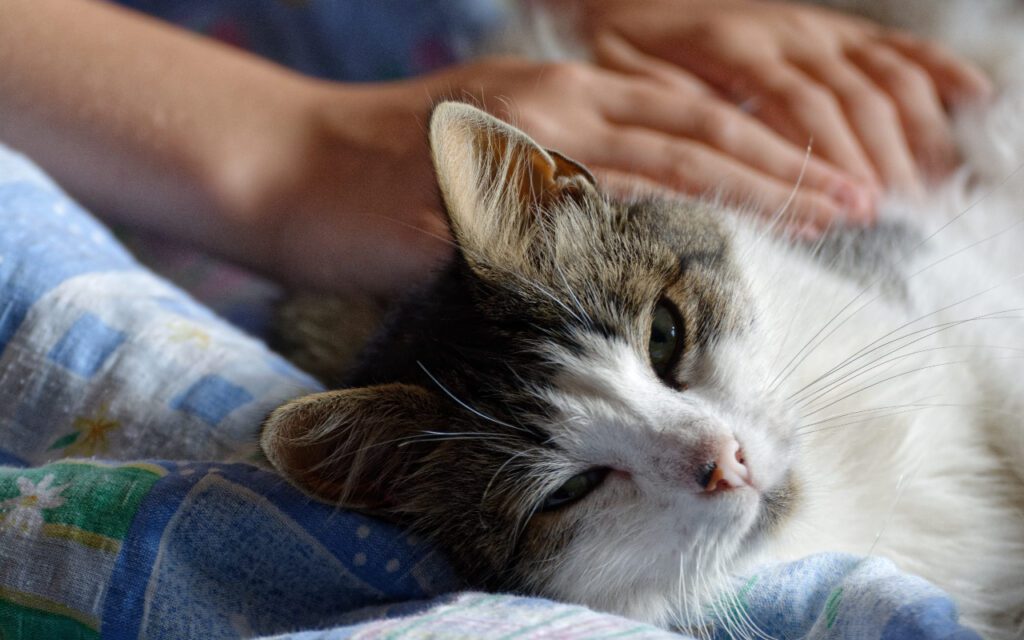While purring is a natural behavior, it can become disruptive if done too often or for extended periods of time.
It’s important to understand the behaviors behind why cats purr and be able to differentiate between what is normal and excessive purring.
- Key Takeaway
- How Much Purring Is Too Much Purring?
- Is It Normal For a Cat To Purr Nonstop?
- Why Cats Purr?
- How Can I Get My Cat To Stop Purring?
- My Cat Won’t Stop Purring? Should I be Concerned
- FAQs
- Q: What does it mean when a cat purrs constantly?
- Q: Why does my cat purr all the time?
- Q: What should I do if my cat stops purring?
- Q: How do I get my cat to purr?
- Q: Why do kittens purr?
- Q: Is it normal for a cat to purr constantly?
- Q: What does it mean when a cat purrs so much?
- Q: Why do cats make a purring sound?
- Q: What are the reasons why a cat would purr?
- In Conclusion
Key Takeaway
- Excessive purring, especially when it is a new behavior or is accompanied by signs of distress or changes in normal behavior, could be an indication of stress, fear, or underlying health issues in a cat.
- Cats purr as a form of communication to express contentment, but they can also purr when they are anxious or unwell as a way to comfort themselves.
How Much Purring Is Too Much Purring?

If your cat has been purring for over an hour without any breaks, it is a sign that something is wrong.
Excessive or constant purring can be a sign of stress, fear, physical pain, or attention-seeking behavior, and any dramatic change in a cat’s purring habits could indicate an underlying health issue or discomfort, necessitating consultation with a veterinarian.
If your cat’s purring behavior changes dramatically or they’re purring more than usual, it could indicate that something is wrong, such as an underlying health issue.
While purring is generally seen as a sign of a content and happy cat, it can also be a self-soothing behavior during stressful situations or even when the cat is sick or injured.
Is It Normal For a Cat To Purr Nonstop?

No. Constant purring is not a good sign. Cats also purr to self-soothe during stressful situations or when they’re injured or unwell.
In fact, the vibrations from purring have been suggested to promote healing in cats.
However, if your cat is purring nonstop, especially if this is a new behavior, it could indicate that they’re sick or in pain.
Kittens and mother cats may purr as a way of bonding, and some cats may purr to maintain a connection with their owner.
Why Cats Purr?
- Contentment: Cats often purr when they are relaxed and content, such as during petting or while sleeping.
- Communication: Kittens will purr to communicate with their mother, signaling that they are okay and not in any danger.
- Healing: Purring may have a healing effect on the cat’s body, as the frequency of the vibrations is thought to promote the healing of bones and reduce pain and inflammation.
- Stress Relief: Cats can also purr when they’re stressed or anxious as a way to comfort themselves.
- In Distress: Surprisingly, cats may also purr when they are in distress or very ill. This is often a way for them to soothe themselves.
- Seeking Attention: Some cats may purr to get their owner’s attention or to signal that they want something.
How Can I Get My Cat To Stop Purring?
If your cat’s purring is causing a problem, make sure your cat is comfortable and has everything they need, such as food, water, and a clean litter box, before you go to bed.
You might also consider providing them with a cozy, quiet place to sleep away from you.
If your cat is purring excessively and you’re concerned about it, you should consult with a veterinarian.
It’s possible that the constant purring could be a sign of an underlying health issue that needs to be addressed.
My Cat Won’t Stop Purring? Should I be Concerned
If your cat won’t stop purring, it may not necessarily be a cause for immediate concern. Purring can be a sign of contentment and relaxation in cats.
However, cats also purr when they’re anxious or unwell as a self-soothing mechanism.
If the constant purring is a new behavior or if it is accompanied by other signs of distress such as changes in eating habits, lethargy, hiding, or changes in their normal behavior, it might be worth consulting with a vet.
Even in the absence of other symptoms, if your cat’s non-stop purring is causing you concern, it’s always a good idea to get them checked out by a professional to rule out any potential health issues.
FAQs
Q: What does it mean when a cat purrs constantly?
A: Constant purring in cats can be a sign of contentment and happiness. Cats often purr when they are being petted or cuddled, or when they are feeling relaxed and comfortable. However, constant purring could also be a sign of stress or pain. It’s important to pay attention to your cat’s body language and overall behavior. This way you can determine the reason behind their constant purring.
Q: Why does my cat purr all the time?
A: Cats purr for various reasons, and some cats simply purr more than others. Purring is a way for cats to communicate their emotions, and it can indicate contentment, relaxation, or happiness. Some cats may also purr when they are anxious or in pain. If your cat is purring excessively and it seems unusual for them, it may be a good idea to have them checked by a veterinarian to rule out any underlying health issues.
Q: What should I do if my cat stops purring?
A: If your cat suddenly stops purring and it is out of character for them, it may be a sign that something is wrong. Cats are known for their ability to hide pain or discomfort, so a sudden change in behavior like not purring could indicate a health issue. It’s important to monitor your cat closely and schedule a visit with a veterinarian if you have any concerns.
Q: How do I get my cat to purr?
A: Not all cats will purr on command, as purring is a natural and instinctive behavior. However, you can encourage your cat to purr by providing them with a comfortable and safe environment, regular play and bonding sessions, and plenty of affection. Some cats may also purr when they are being gently stroked or massaged. Remember, every cat is unique, so what works for one cat may not work for another.
Q: Why do kittens purr?
A: Kittens start purring when they are just a few days old. Purring is a way for kittens to communicate with their mother and littermates, as well as provide comfort and reassurance. It’s a natural instinct for kittens, and it helps create a bond within the litter. As they grow older, kittens continue to purr as a way of expressing contentment and happiness.
Q: Is it normal for a cat to purr constantly?
A: While some cats tend to purr more than others, constant purring may indicate something is amiss. Cats may purr constantly due to stress, anxiety, or an underlying health issue. If your cat is continuously purring and it appears to be affecting their daily routine, it’s advisable to consult with a veterinarian to rule out any medical conditions.
Q: What does it mean when a cat purrs so much?
A: If your cat is purring excessively, it could be a sign of contentment and happiness. Cats often purr when they are being petted or enjoying affection from their owners. However, excessive purring could also indicate stress, anxiety, or pain. Therefore, it’s essential to consider your cat’s overall behavior and body language to determine the reason behind their excessive purring.
Q: Why do cats make a purring sound?
A: Cats make a purring sound as a means of communication. It is a way for them to express contentment, relaxation, and happiness. Some cats also purr when they are seeking attention or when they are in pain. Purring can serve as a form of self-soothing for cats, and it’s a behavior deeply ingrained in their instincts.
Q: What are the reasons why a cat would purr?
A: Cats purr for various reasons, including expressing contentment and happiness, seeking attention or affection, and communicating with their owners or other cats. Purring can also be a way for cats to self-soothe when they are in pain or feeling stressed. Understanding the context and body language accompanying the purring can help decipher the exact reason behind a cat’s purring.
In Conclusion
When it comes to purring, a certain level of noise is generally expected and can be considered normal.
However, if you notice that your cat’s purring has become excessive or sounds different than usual, it could be an indication that something is wrong.
It’s important to pay attention to these changes and monitor the amount of purring in order to ensure your cat’s well-being.





Leave a Reply